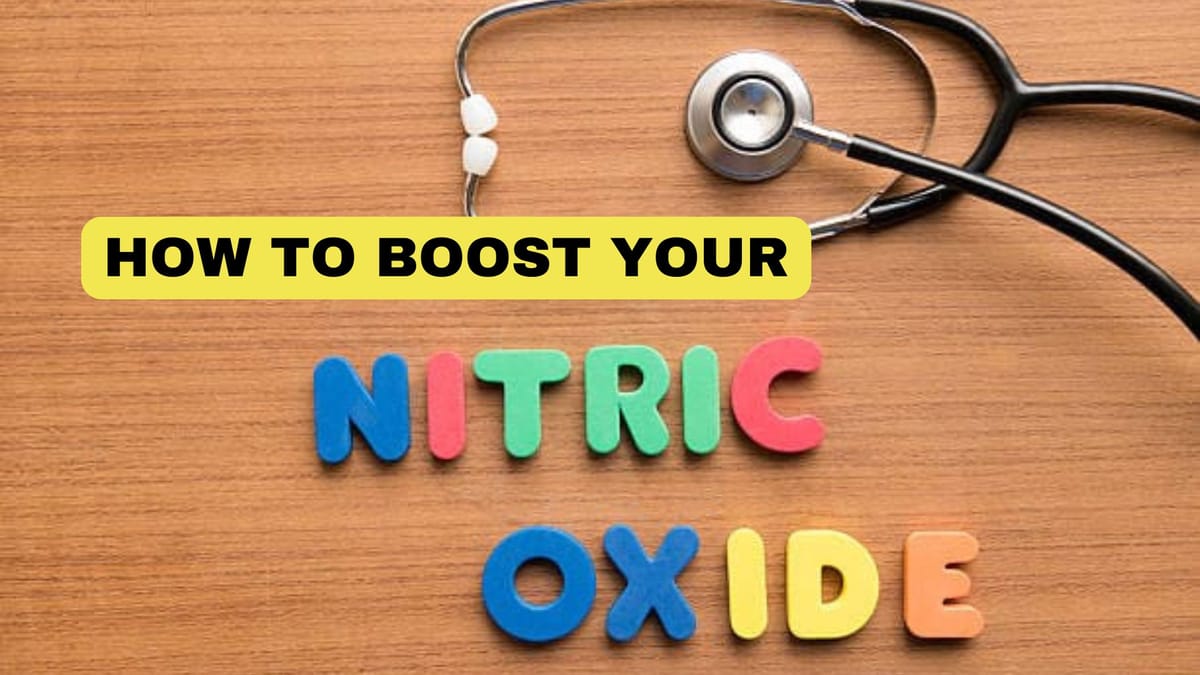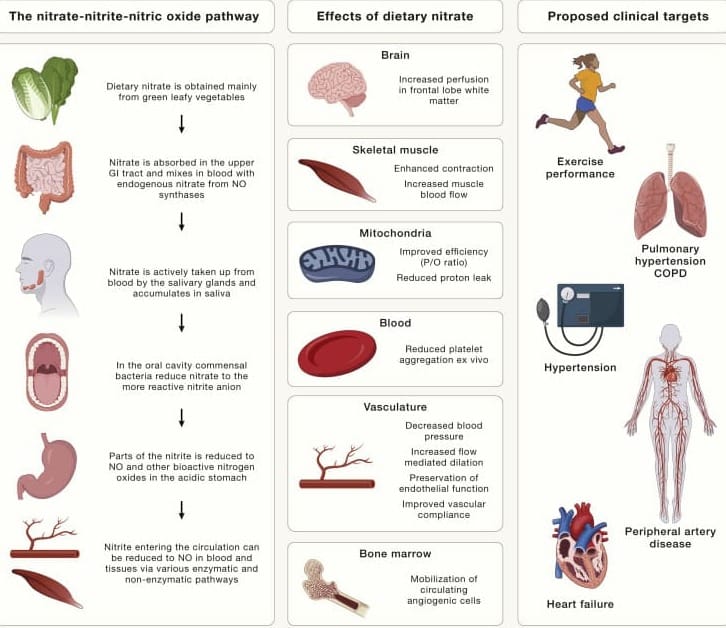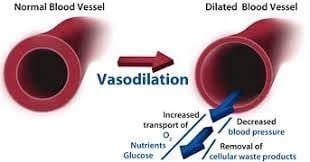Boosting Nitric Oxide: Effective Strategies for Optimal Health
Nitric oxide is an essential molecule required for overall health. As a vasodilator, nitric oxide signals the blood vessels to relax, allowing them to expand. This effect enables blood, nutrients, and oxygen to flow freely to every part of your body.

Nitric oxide is an essential molecule required for overall health. As a vasodilator, nitric oxide signals the blood vessels to relax, allowing them to expand. This effect enables blood, nutrients, and oxygen to flow freely to every part of your body.
You may have heard of nitric oxide in passing, perhaps in a conversation about heart health or exercise performance. But what exactly is this molecule, and why is it so important for our overall well-being? In this article, we'll explore nitric oxide and its functions, benefits, and ways to boost its production in your body. By the end, you'll understand why this tiny molecule is making such big waves in the health and wellness community.
Why not listen to the podcast?
What is Nitric Oxide?
Nitric oxide (NO) is a simple molecule composed of one nitrogen atom and one oxygen atom. Do not let its simplicity fool you, though – this gas plays a crucial role in various bodily functions. Discovered in the 1980s, nitric oxide quickly became the subject of intense scientific research, leading to a Nobel Prize in Physiology or Medicine in 1998 for its discoverers.
Key Functions of Nitric Oxide
The Benefits of Optimal Nitric Oxide Levels
- Cardiovascular Health: By improving blood flow, it can help to:
- Lower blood pressure
- Reduce the risk of blood clots
- Decrease the likelihood of atherosclerosis (hardening of the arteries)
- Improve overall heart function

- Exercise Performance: Athletes and fitness enthusiasts often seek ways to boost nitric oxide levels because it can:
- Enhance oxygen and nutrient delivery to muscles
- Improve exercise endurance
- Reduce muscle soreness and fatigue
- Potentially speed up recovery times
- Brain Function: As a neurotransmitter, nitric oxide contributes to cognitive health by:
- Supporting memory formation and recall
- Helping regulate sleep patterns
- Potentially playing a role in mood regulation

- Sexual Health: Nitric oxide's vasodilation properties are crucial for sexual function, particularly in:
- Achieving and maintaining erections in men
- Enhancing arousal and lubrication in women
- Immune System Support: Nitric oxide assists the immune system by:
- Helping to destroy harmful bacteria and other pathogens
- Potentially reducing inflammation in the body
Signs of Low Nitric Oxide Levels
While there is no simple at-home test for nitric oxide levels, some signs that you might be deficient include:
- Fatigue: Low levels of NO can lead to reduced blood flow and oxygen delivery, resulting in feelings of chronic fatigue and exhaustion.
- Poor Vision: Nitric oxide is essential for regulating intraocular pressure. Insufficient NO may lead to fluid buildup in the eyes, causing vision problems.
- Hypertension: NO helps dilate blood vessels; low levels can cause elevated blood pressure, increasing the risk of cardiovascular issues.
- Cognitive Decline: Insufficient NO can impair blood flow to the brain, potentially leading to memory loss, difficulty concentrating, and cognitive decline.
- Erectile Dysfunction: NO is crucial for achieving and maintaining erections. Low levels can contribute to erectile dysfunction in men.
- Slow Wound Healing: NO promotes blood flow and reduces inflammation, so low levels can slow the healing process of wounds.
- Cold Extremities: Reduced circulation due to low NO can result in cold hands and feet, as the body struggles to maintain proper blood flow to extremities.
- Increased Stress and Anxiety: Low NO levels can affect mood regulation, leading to heightened stress and anxiety responses.
- Muscle Soreness and Poor Exercise Performance: Insufficient NO can lead to decreased endurance and increased muscle soreness post-exercise, as it is vital for nutrient and oxygen transport during physical activity.
- Migraines: Low levels of NO have been linked to the onset of migraines, as it plays a role in regulating blood flow in the brain.

Natural Ways to Boost Nitric Oxide Production
Nitric oxide is not found directly in foods but is synthesized from dietary nitrates and amino acids. Here are some foods that can help boost nitric oxide levels:
- Diet: Certain foods can help increase nitric oxide production in your body:
a) Nitrate-rich vegetables:
- Beetroot and beetroot juice
- Leafy greens like spinach, arugula, and kale
- Celery
- Lettuce
- Garlic

b) Foods high in arginine (an amino acid that's a precursor to nitric oxide):
- Nuts and seeds (especially pumpkin seeds and walnuts)
- Watermelon
- Legumes
- Certain meats like turkey and chicken
c) Antioxidant-rich foods:
- Berries (blueberries, strawberries, raspberries)
- Dark chocolate
- Pomegranates
- Citrus fruits

- Exercise: Regular physical activity can stimulate nitric oxide production. Aim for at least 150 minutes of moderate-intensity exercise or 75 minutes of vigorous-intensity exercise per week.
- Sun Exposure: Moderate sun exposure can help your body produce nitric oxide. Aim for 10-15 minutes of sunlight on your skin daily, but remember to practice safe sun habits to avoid overexposure.
- Proper Breathing: Deep, diaphragmatic breathing can help increase nitric oxide levels. Slow, deep breaths through your nose for a few minutes each day.
- Manage Stress: Chronic stress can deplete nitric oxide levels. Incorporate stress-management techniques like meditation, yoga, or mindfulness into your daily routine.
- Stay Hydrated: Proper hydration is essential for optimal nitric oxide production.

Supplements That May Help
While it is always best to obtain nutrients from whole foods, some supplements may help boost nitric oxide levels:
- L-arginine: This amino acid is a precursor to nitric oxide.
- L-citrulline: Another amino acid that can be converted to L-arginine
- Beetroot powder: A concentrated form of nitrate-rich beetroot.
- Vitamin C: This antioxidant can help preserve nitric oxide in the body.
- Vitamin E: Another antioxidant that works synergistically with vitamin C.
While nitric oxide is generally safe when produced naturally by the body, some people may experience side effects from supplements. Always consult with a healthcare professional before starting any new supplement regimen.
The Dangers of Nitrates and Nitrites Found in Processed Meats
While nitrates from vegetables are beneficial, nitrates and nitrites found in processed meats can pose health risks. These substances can convert into nitrosamines in the body, which are linked to an increased risk of certain cancers, particularly colorectal cancer. It is important to differentiate between the healthy nitrates in whole foods and the potentially harmful nitrates in processed foods.
The Future of Nitric Oxide Research
As scientists continue to uncover the many roles of nitric oxide in the body, research is ongoing in several exciting areas:
- Cancer: Some studies suggest that nitric oxide may have both pro- and anti-cancer effects, depending on its concentration and the type of cancer.
- Alzheimer's Disease: Researchers are exploring the potential of nitric oxide in improving blood flow to the brain and potentially slowing cognitive decline.
- Diabetes: Nitric oxide's role in improving insulin sensitivity is being investigated as a potential avenue for diabetes management.
- COVID-19: Recent studies have looked at the potential of inhaled nitric oxide in treating severe cases of COVID-19, though more research is needed.
Nitric oxide may be a simple molecule, but its impact on our health is profound and far-reaching. From supporting heart health and exercise performance to potentially playing a role in cognitive function and immune support, this powerful gas is a vital component of our overall well-being.






